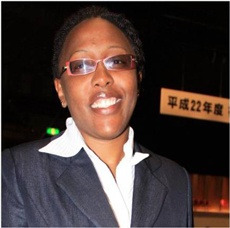Monica Kahumburu: My Experience as a MEXT Scholar
Profile:
Ms. Monica Kahumburu is a beneficiary of the Ministry of Education, Culture, Sports, Science, and Technology (MEXT) scholarship during the period October 2008 –March 2012. She joined Kobe University as a research student, and in April 2010, after passing the university’s entrance examinations, she joined the Graduate School of Humanities to study Linguistics.
Currently, Ms. Kahumburu teaches Japanese at Strathmore University. She is also working with The Catholic University of Eastern Africa (CUEA), as she strives towards completing her Ph.D. studies with Kobe University.

My Experience as a MEXT Scholar
It was a great honour to have been granted the MEXT scholarship to pursue postgraduate studies in Linguistics, a field which I feel has largely been underexplored in Kenya. I hope by sharing my experience, many young Kenyans will be encouraged to consider Language/Linguistics in their careers.
Let me begin by talking about the experience I had in the MEXT selection process. After seeing an advertisement in the local dailies about the Japanese Government Scholarships, I checked the Embassy’s website to get further information. I then filled and sent the application form to the Embassy. The applicants were also requested to send in a research proposal, outlining the research plan and expected outcome.
After this stage, successful applicants were invited to sit for a written examination. Since I would be required to apply Japanese language in my research, I had to prove that I was proficient enough in Japanese, and therefore sat for two exams: the English and Japanese language exams, both administered by MEXT. Fortunately, in the website http://www.studyjapan.go.jp/en/toj/toj0302e-32.html#1, I found past MEXT examinations that helped me prepare adequately. After a few days, I was informed that I had passed the written examination, and invited for an interview. The interview was mainly based on my research proposal. The next stage was the most difficult. I had to contact Japanese universities in order to find a professor in Linguistics, who would accept to be my supervisor. Again, luck was on my side as earlier contact with Professor Ritsuko Miyamoto (Akita University) really came in handy. Professor Miyamoto, who was in Kenya at the time when I was looking for a supervisor in Japan, was indeed very helpful in identifying and contacting a professor in Cognitive Linguistics, which is my field of study.
Identifying a supervisor in one’s field of research is accomplishing half the task. The other part was to convince a prospective supervisor that I was competent (or willing to work towards competence) in order to successfully engage in postgraduate studies at Kobe University. I sent my previous MA thesis so that the professor at Kobe University could evaluate and advise on areas that I would require to work on, in order to meet the requirements for the postgraduate entrance examination at Kobe University. Only after the professor was convinced that I understood the requirements for postgraduate study at Kobe University, did he agree to fill in the Letter of acceptance, which I then submitted to the Embassy. Submitting the Letter of acceptance is the applicant’s final requirement. One then awaits feedback from the Embassy.
After a few weeks, the Embassy informed me that I had been selected for the year 2008 MEXT program. I was very excited that I finally had the opportunity to study Linguistics, and looked forward to the new life in Kobe.
On 2nd October 2008, I left Kenya for Japan. As soon as I started attending classes at Kobe University, it became clear to me why my supervisor was keen to know about my qualifications before he could accept me. The high standard of education, coupled with being in class with other brilliant students from Japan and other parts of the world, can be quite intimidating if one is not equal to the task. Thankfully, the university assigns a tutor to international students. We would have study group discussions with the tutor and other fellow students, and this helped clarify content that was unclear during the lectures.
The lecturers are also very helpful, and a lot of emphasis is given to the student’s research. Every week, students were scheduled to present their research to lecturers and other students in the department, and during this session, they would answer questions raised about their research, for example, the methodology, findings, etc. The comments/advice received during the presentation enabled one build on his/her research. This, to me, was the most important class because, not only did I get to learn about my colleagues’ research, but also got some pointers which I would apply in my research. Needless to say, presentations also aid in building one’s confidence, and adequately prepare the student for the final defense of one’s thesis.
In summary, studying in Japan made me realize the true meaning of academia. It is not only about getting good grades that will lead to finding a good job, but it is about (a) identifying a problem, (b) finding out what has previously been done about it, (c) suggesting new ways that help solve the problem. These solutions, when applied, certainly contribute to better living. In other words, research should be tied to alleviating the problems facing our community. As stated earlier, language is one area that, if given adequate attention, can help solidify our identity, and enable preserve our heritage for posterity. I am glad that Japan continues to give me opportunities to further my research on linguistics, through projects such as Studies of event integration patterns in African languages, where I hope to make contributions about linguistic phenomena of the Gikuyu language.
To prospective scholars to Japan: be open-minded, make new friends, and engage in activities that enable you interact with the Japanese people. In other words, try to find ways through which you can utilize the limited time in Japan to the benefit of your future goals and aspirations.
